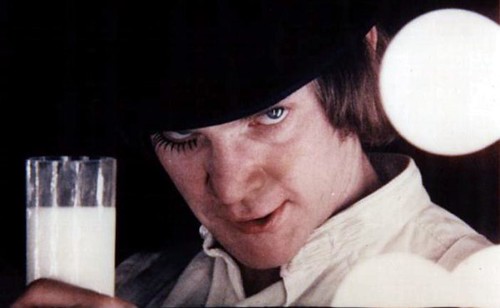 One of my anonymous readers dropped me an off topic note about a film appearing at Sundance called "Downloading Nancy." The film is about a woman into self mutilation played by Maria Bello who recruits a man she meets online to kill her in cruel and sadistic ways.
One of my anonymous readers dropped me an off topic note about a film appearing at Sundance called "Downloading Nancy." The film is about a woman into self mutilation played by Maria Bello who recruits a man she meets online to kill her in cruel and sadistic ways. Now the anonymous reader wanted to know why actors with fairly decent careers would make a film, which I haven't seen so I won't judge it myself, but most reports describe as "unwatchable," and one called it "the worst of Sundance."
Well, like most things it starts with a history lesson.
The Silent Era in movie history was an amazing time of experimentation, not only in the technique
 s of narrative cinema, but in subject matter as well.
s of narrative cinema, but in subject matter as well.Many silent films tackled controversial topics like sex, religion, political and social corruption, violent crime, and morally ambiguous themes.
These films were often seen as shocking to America's still predominantly rural population, and many groups, inspired by the militant Protestantism that created Prohibition were started to demand more "decency" in popular entertainment.
What was considered even more shocking were the scandalous exploits of the stars themselves, a life of fame, wealth, liquor, drugs and casual sex all reported with salacious detail by the fledgling tabloid press who managed to get past the studio's publicity police. (the more things change the more they stay the same.)
 One of the events that brought things to a head with the arrest and trial of Silent Screen comedian and director Roscoe "Fatty" Arbuckle for a rape and murder that didn't actually happen. Even though he was acquitted and the jury presented a written apology the mainstream and tabloid press attacked him so viciously with bogus tales of sexual perversity and violence, he wouldn't work on screen again for 10 years.
One of the events that brought things to a head with the arrest and trial of Silent Screen comedian and director Roscoe "Fatty" Arbuckle for a rape and murder that didn't actually happen. Even though he was acquitted and the jury presented a written apology the mainstream and tabloid press attacked him so viciously with bogus tales of sexual perversity and violence, he wouldn't work on screen again for 10 years.Because of this frenzy many of the "decency" groups
 demanded some form of government regulation and censorship of the film industry. The moguls of that time, all shrewd businessmen, didn't want government involvement at all, so they hired ex-Postmaster General Will Hayes to oversee an industry-run regulation and censorship system officially called The Production Code, but popularly known as The Hayes Code.
demanded some form of government regulation and censorship of the film industry. The moguls of that time, all shrewd businessmen, didn't want government involvement at all, so they hired ex-Postmaster General Will Hayes to oversee an industry-run regulation and censorship system officially called The Production Code, but popularly known as The Hayes Code.I won't go into too much detail about what the Hayes Code demanded of film-makers, but it was strict, and it was strictly enforced well into the 1960s.
Some filmmakers thrived under the code, using their imaginations to find out clever ways to get around it, or doing things simply to annoy, confound and confuse the Code's enforcers. The entire genre of Film Noir was pretty much built on pushing Code buttons.
Like everything else, things began to change in the 1960s. Television's rise meant that movies didn't have to be all things to all people anymore. A new system rating films for their content was created, allowing more daring, and occasionally shocking films to be made. Many of those films have become critically acclaimed hits like The Wild Bunch, Psycho, Last Tango in Paris, The Silence of the Lambs, A Clockwork Orange, etc...etc...
As time went by, what was considered shocking on
 one era, became after-school television in another, but there was always a desire to push past the boundaries of popular taste to see if fertile creative ground lay beyond.
one era, became after-school television in another, but there was always a desire to push past the boundaries of popular taste to see if fertile creative ground lay beyond.But not all makers of shocking films are that noble or curious in their intentions.
Others seek shock for the sake of shock in order to cover for a lack of narrative or cinematic quality.
Sadly these films are in the majority, and are able to attract backing and actors to appear in them for two reasons. Partly, most backers and actors, like most people, have a hard time discerning truly groundbreaking work, from talentless hack-work, and can be tricked into thinking it's good because it's shocking. The other reason is a latent but still powerful desire to rebel against the Hayes Code and derive some sort of joy from shocking and disgusting the 'peasantry.'
So you will periodically get films who sole purpose is to shock, disgust, and mostly annoy the general public. Thankfully, the really crappy ones will disappear into the nether-regions of cinematic failure.

No comments:
Post a Comment